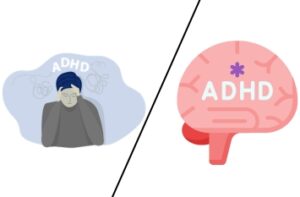
ADHD in Adults: Signs, Symptoms, and Treatment Options in Frisco, TX
ADHD in Adults: Signs, Symptoms, and Treatment Options in Frisco, TX Attention-Deficit/Hyperactivity Disorder, ADHD, is often thought of as a childhood condition, but millions of

Arguing with a bipolar person can be particularly challenging due to the nature of the disorder. Bipolar disorder, characterized by extreme mood swings between manic and depressive episodes, affects both men and women. However, research suggests that the prevalence of bipolar disorder is nearly equal among genders, with approximately 2.8% of the U.S. adult population experiencing this condition annually.
Understanding the unique challenges faced by those with bipolar disorder is crucial for effective communication and conflict resolution. This blog aims to provide insightful, practical advice for navigating arguments with someone who has bipolar disorder, promoting a more empathetic and informed approach.
Bipolar disorder, formerly known as manic-depressive illness, is a mental health condition characterized by extreme mood swings that include emotional highs (mania or hypomania) and lows (depression). A person with bipolar disorder experiences these intense mood episodes, which can significantly impact their daily life, relationships, and overall well-being.
During manic phases, individuals may feel euphoric, full of energy, or unusually irritable, while depressive phases can lead to feelings of sadness, hopelessness, and a lack of energy.
Understanding the nature of bipolar disorder is essential in recognizing the challenges faced by those who live with it and in fostering more supportive and effective communication.
When arguing with a bipolar person, it’s crucial to be mindful of your language and approach. Certain words and phrases can exacerbate their emotional state and lead to more intense conflicts. Avoiding these can help in maintaining a calm and constructive conversation. Here are some words to avoid:
The duration of anger in a bipolar person can vary widely depending on several factors, including the phase of their disorder, individual triggers, and their overall mental health management. During manic or hypomanic episodes, anger and irritability can be more intense and prolonged, potentially lasting from a few hours to several days.
In contrast, depressive episodes might involve more subdued, prolonged irritability rather than overt anger. Additionally, the effectiveness of treatment and coping strategies can play a significant role in mitigating the duration and intensity of these angry episodes.
It’s important to remember that each individual’s experience with bipolar disorder is unique, and understanding their specific patterns and triggers can help in managing these episodes more effectively.
Conflicts in a bipolar relationship can arise from the various symptoms and behaviors associated with the disorder. These challenges can strain the relationship, leading to misunderstandings and emotional turbulence.
Obsession with suicidal ideation: Persistent thoughts about suicide can create significant worry and distress.
Self-harming behaviors: Actions that cause physical harm can be alarming and difficult for partners to handle.
Hypersexuality: Increased sexual urges can lead to impulsive behaviors that may hurt the relationship.
Pressured speech: Rapid, incessant talking can overwhelm and frustrate partners.
Severe irritability: Heightened irritability can lead to frequent arguments and tension.
Irrational thoughts: Unreasonable beliefs and fears can result in confusion and conflict.
Bipolar anger: Intense and unpredictable anger can create a volatile environment.
Psychosis: Episodes of losing touch with reality can be frightening and challenging to manage.
Different thought patterns, such as black-and-white thinking: This can cause misunderstandings and inflexible viewpoints.
Bipolar disorder cycles: The alternating phases of mania and depression can create instability and unpredictability in the relationship.
Navigating arguments with a bipolar person requires a thoughtful and compassionate approach. Here are some essential tips to keep in mind to ensure that your interactions remain respectful and constructive:
When arguing with a bipolar person, it’s crucial to avoid judgment. Recognize that their reactions and emotions are influenced by their disorder. Instead of criticizing or blaming, approach the situation with empathy and understanding. A judgment-free attitude helps to foster a supportive environment where constructive dialogue can occur.
Effective communication is key to resolving conflicts with a bipolar person. Speak clearly, listen actively, and avoid interrupting. Use “I” statements to express your feelings without sounding accusatory, for instance, saying “I feel hurt when…” rather than “You always…”. This approach helps in minimizing defensiveness and encourages open, honest communication.
Compassion is essential when dealing with the complexities of bipolar disorder. Understand that their behavior during an argument might be a manifestation of their condition. Show patience and kindness, and try to put yourself in their shoes. Compassionate interactions can de-escalate tensions and promote a more peaceful resolution.
Setting boundaries is important to protect both parties’ well-being. Clearly communicate your limits regarding unacceptable behavior, and be consistent in enforcing them. Boundaries help in maintaining respect and preventing conflicts from escalating. Ensure that these boundaries are fair, and respectful, and prioritize mutual understanding.
Offering encouragement can make a significant difference during conflicts. Recognize and praise their efforts to manage their condition and cope with challenging situations.
Positive reinforcement helps in building their confidence and can motivate them to engage in more constructive behaviors. Encouragement fosters a supportive atmosphere, making it easier to navigate disagreements.
Maintaining your composure during an argument with a bipolar person is vital. Your calm demeanor can help to de-escalate the situation and prevent further emotional outbursts. Take deep breaths and manage your tone to avoid adding fuel to the fire. By staying calm, you set a positive example and create a more stable environment for resolving conflicts.
Educating yourself about bipolar disorder can improve your ability to handle arguments effectively. Understanding the symptoms, triggers, and treatment options gives you a better perspective on what the person is going through.
This knowledge allows you to approach conflicts with greater empathy and provides tools to manage and mitigate disputes more effectively.
Sometimes, taking a break during an argument can prevent it from escalating. If the discussion becomes too heated, suggest a temporary pause to cool down and gather your thoughts. This break can provide much-needed space for both parties to reflect and return to the conversation with a clearer, calmer mindset.
If arguments are frequent and severe, seeking professional help can be beneficial. Therapists or counselors specializing in bipolar disorder can offer strategies for effective communication and conflict resolution.
Professional guidance can also provide support for both the individual with bipolar disorder and their loved ones, helping to strengthen the relationship.
Instead of dwelling on the problem, focus on finding solutions during an argument. Work together to identify the root cause of the conflict and brainstorm ways to address it constructively. By concentrating on solutions, you shift the conversation from blame to cooperation, fostering a more positive and productive dialogue.
Living with a bipolar person requires understanding, patience, and proactive support. It’s essential to educate yourself about bipolar disorder, including its symptoms, triggers, and treatment options. Encourage open communication where both parties feel heard and respected.
Establishing routines and structure can help stabilize mood swings and reduce stress. Supporting them in adhering to their treatment plan, which may include medication and therapy, is crucial. Additionally, taking care of your own well-being is essential.
Seek support from therapists or support groups to navigate challenges and ensure you have the resilience needed to maintain a healthy relationship. With empathy, communication, and a supportive environment, living with a bipolar person can be managed effectively, fostering understanding and resilience for both parties involved.
It is not advisable to leave bipolar disorder untreated. Bipolar disorder is a chronic condition that can significantly impact a person’s life if not managed properly. Untreated bipolar disorder can lead to severe mood episodes, impairments in functioning at work or in relationships, and an increased risk of suicide.
The symptoms of bipolar disorder can worsen over time without treatment, potentially causing more frequent and intense episodes. Effective treatments, including medications, psychotherapy, and lifestyle adjustments, can help stabilize mood swings, manage symptoms, and improve overall quality of life.
Arguing with a bipolar person can be uniquely challenging due to their fluctuating emotions and perceptions. It’s important to approach disagreements with sensitivity and understanding of their condition. Avoid escalating tensions by staying calm, using non-confrontational language, and validating their feelings. Listening actively and acknowledging their perspective can foster mutual respect and promote more constructive resolutions.

ADHD in Adults: Signs, Symptoms, and Treatment Options in Frisco, TX Attention-Deficit/Hyperactivity Disorder, ADHD, is often thought of as a childhood condition, but millions of

Tele-Psychiatry in Frisco, TX: Convenient, Confidential Mental Health Care From Anywhere Mental health care should be accessible, flexible, and fit into your life—not add more

When Medication Isn’t Enough: Exploring Advanced Depression Treatments in Frisco, TX Depression is a complex medical condition that affects mood, energy, motivation, sleep, and overall
